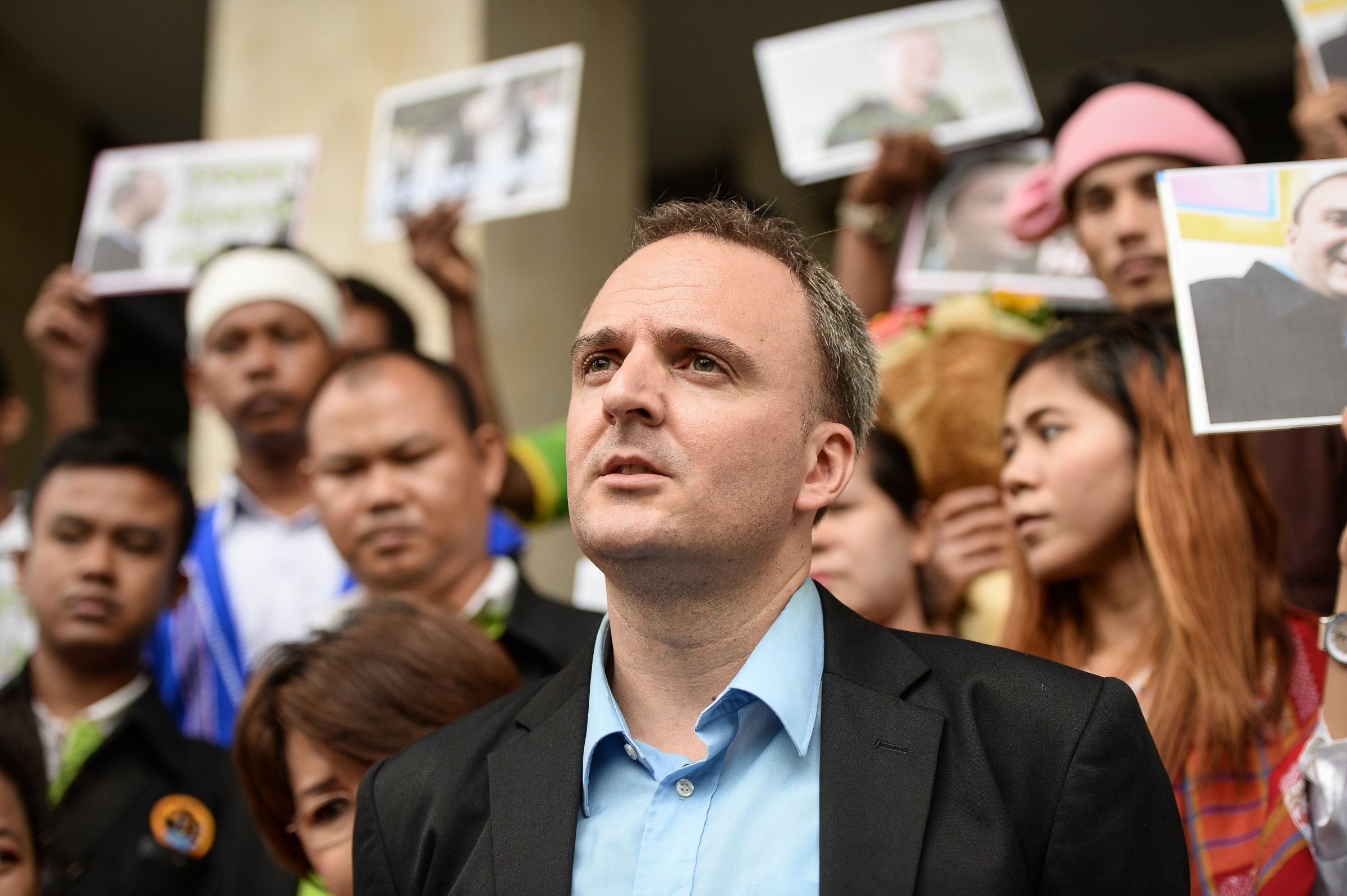
A British activist has been dealt a suspended sentence of three years in Thailand on charges of defamation and computer crimes, a Bangkok court ruled Tuesday, in a surprise end to a case that has dragged on for nearly four years and stunned rights advocates.
Andy Hall, 36, was convicted of criminal defamation and violation of Thailand’s controversial Computer Crimes Act in relation to research he conducted for a report alleging serious labor abuses at a Thai pineapple-processing plant, Natural Fruit.
The report, Cheap Has a High Price, accused a number of Thai factories of using forced labor, child labor, unfair wages and excessive overtime. These findings were published in 2013 by the NGO Finnwatch, a corporate watchdog that audits European suppliers. Food exports are a multibillion dollar industry vital to the Thai economy, supplying major global markets such as the U.S., E.U. and Japan.
Natural Fruit has denied all allegations of unlawful labor practices.
Read More: A British Labor Activist’s Trial in Thailand Puts Free Speech in the Spotlight
“We are shocked by today’s verdict,” Sonja Vartiala, executive director of Finnwatch, said in a statement. “Andy has been made a scapegoat in order to stifle other voices that speak out legitimately in support of migrant worker rights.”
Defamation is a criminal offense in Thailand, which has a number of antilibel tools in its legal repertoire. Hall initially faced four charges leveled by Natural Fruit; two criminal cases were ruled on Tuesday while two civil suits remain in the courts, one seeking damages of about $10 million.
Hall’s three-year sentence will be suspended for two years and Finnwatch says that he will not go to prison if he doesn’t commit a crime during the two-year period. But Hall told TIME on Monday that he has already been threatened with additional charges by another company with regard to an unrelated incident.
Just a day before the verdict, Hall said that he was “confident” the court would rule in his favor, arguing that he neither wrote the offending content nor uploaded it to the internet. More importantly, he said, some 24 people including migrant workers referred to in the research, testified in his defense that abuses detailed in the report were true.
“That’s what we want the court to rule on,” Hall said, referring to the allegedly unlawful labor practices of some Thai manufacturing companies. He could not be reached on Tuesday and is currently in police custody pending payment of a $4,300 fine.
Lawyers and rights advocates roundly condemned the verdict, claiming it could have a “chilling effect” on free speech and warning that the case has done damage to Thailand’s already bruised global image.
Kingsley Abbott, senior international legal adviser with the International Commission of Jurists, tells TIME that Hall’s criminal conviction was “a real blow to human rights in Thailand.”
“This case is yet another example … of why Thailand must decriminalize defamation and repeal or revise its broadly worded Computer Crime Act law to prevent them from being used to silence human-rights defenders and journalists working on important public interest issues,” he says.
Read More: Child Slaves May Have Caught the Fish in Your Freezer
Hall’s case, which has kept him in and out of the Thai court system for nearly four years, coincided with increased scrutiny over Thailand’s labor practices. Thailand is host to about 3 million migrant laborers, about half of them from neighboring Burma, the rest mostly from Cambodia and Laos. Thailand has long had a bad track record on human trafficking — as poor migrant workers regularly pay brokers to bring them across the border and find them work. Often they are delivered into vulnerable positions where they are denied legal documents and protective services.
Thailand was recently upgraded in the U.S. State Department’s annual human-trafficking report, a move viewed by some as a political maneuver that undermined progress and ignored abuses in the food-processing industry. Investigations in recent years have alleged official complicity in human trafficking and exposed slavery in Thai businesses, particularly the country’s enormous seafood sector.
More Must-Reads from TIME
- Why Trump’s Message Worked on Latino Men
- What Trump’s Win Could Mean for Housing
- The 100 Must-Read Books of 2024
- Sleep Doctors Share the 1 Tip That’s Changed Their Lives
- Column: Let’s Bring Back Romance
- What It’s Like to Have Long COVID As a Kid
- FX’s Say Nothing Is the Must-Watch Political Thriller of 2024
- Merle Bombardieri Is Helping People Make the Baby Decision
Contact us at letters@time.com